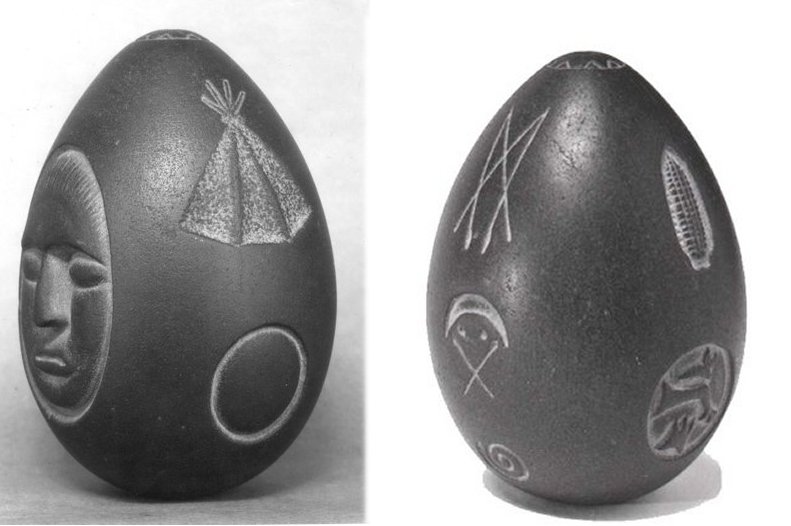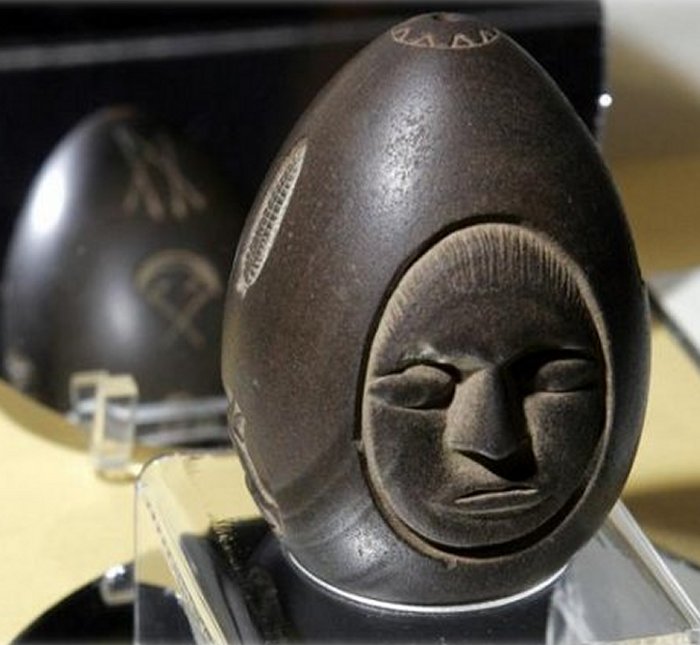Ellen Lloyd - AncientPages.com - Few people interested in history can resist a true archaeological mystery.
Imagine suddenly finding a strange, dark, odd-looking, egg-shaped stone with unusual carvings and unknown origin. What would you think?
Credit: Public Domain
This is what happened in 1872 when a couple of construction workers dug up a suspicious lump of clay near the shore of Lake Winnipesauke and discovered an artifact that today is known as "New England's Mystery Stone."
Scientists are still trying to determine how the stone was made and for what purpose.
Furthermore, so far, it has been impossible to verify the age of the stone and determine how it was carved. To make it even more interesting, the unknown creator decided to add many inscriptions and strange symbols that are still open to interpretation.
The stone is a type of quartzite, derived from sandstone, or mylonite, a fine-grained, laminated rock formed by the shifting of rock layers along faults. The 4-inch-long, 2 1/2-inch-thick stone is dark and egg-shaped. It includes many carvings like a face, teepee, ear of corn, and geometric figures resembling circles. The rock type is unfamiliar to New Hampshire.
Over the years, many scientists have attempted to unravel the stone's mysterious background. Some, like the American Naturalist, suggested that the stone "commemorates a treaty between two tribes."
New England's Mysterious Stone - Credit: Public Domain
Others believed that the stone was a Celtic or Inuit artifact, but we still do not know who created the Mystery Stone Of New England.
Another curious detail is that holes are bored in both ends of the stone, with different size bits. Each bore is straight, not tapered.
According to an analysis done by state officials in 1994, the holes in both ends of the stones were bored with different size bits. Each bore is straight and not tapered.
"I've seen a number of holes bored in stone with technology that you would associate with prehistoric North America," said Richard Boisvert, state archaeologist. "There's a certain amount of unevenness ... and this hole was extremely regular throughout."
Boisvert suggested the holes were drilled by power tools, perhaps from the 19th or 20th centuries. "What we did not see was variations that would be consistent with something that was several hundred years old," he said.
According to geologist Eugene Boudette, who studied this mysterious stone, "it is a type of quartzite, derived from sandstone, or mylonite, a fine-grained, laminated rock formed by the shifting of rock layers along faults. The rock type was not familiar to New Hampshire, but the state could not be ruled out as the source," Boisvert said to his knowledge, the stone is unique. "That makes it very hard to figure out where it fits," he said.
One problem is that the story of the stone's discovery is fuzzy, he said.
"You couldn't be certain exactly what kind of context it came from. There's a lot of ambiguity there ... it's very difficult to evaluate it," he said. "The context of the discovery is sometimes more important than the item itself."
For example, Boisvert said, if the item had been something used by a fraternal order that has its own secrets and mysteries, "that means the information doesn't get out very well, does it? The information may have been available at one point, but it's really no longer available to us. Who knows?"
For what purpose was the stone created, and what is the meaning of the symbols?
This question remains unanswered. One possibility of solving this ancient is if we could find an artifact with similar symbols and compare the inscriptions. However, we might have to wait a long time before this happens, if ever…
Maybe one day, we will learn the true story of the Mystery Stone of New England, which is undoubtedly one of America's most curious artifacts.
Updated on April 3, 2022
Written by Ellen Lloyd – AncientPages.com
Copyright © AncientPages.com All rights reserved. This material may not be published, broadcast, rewritten or redistributed in whole or part without the express written permission of AncientPages.com







